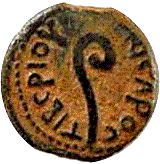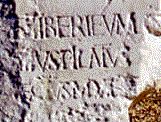The best known Roman governor of Judea
to later history because of his role in the accounts of Jesus' execution. Pilate
probably came from the ranks of cavalry officers [equites]
from which Rome regularly drew the prefects of smaller occupied
provinces like Judea.
His appointment as prefect of Judea in the latter half of the reign
of Tiberius---when
the brutal Praetorian captain Sejanus was de facto ruler of
Rome---is confirmed by reports in Josephus
& a stone found in 1962 at
Caesarea Maritima [the capitol of the
Roman province of Palestine], inscribed: "[Thi]s Tiberieum [Pon]tius
Pilatus, Prefect of Judea, [mad]e."
The Pilate described by Josephus
& the Roman historian Tacitus was a strong willed, inflexible
military governor who was insensitive to the religious scruples of
his Jewish & Samaritan subjects & relentless in suppressing
any potential disturbance. This stands in sharp contrast to the
impression conveyed in the Christian gospels which, for apologetic
reasons, portray him as reluctant to execute Jesus. Pilate's decade
long tenure (26-36 CE) testifies to both his relative effectiveness
in maintaining order & to the aging emperor's lack of personal
attention to administrative affairs. The ruthless slaughter of
thousands of Samaritan pilgrims by Pilate's cavalry (ca. 36 CE),
however, led to such a strong Palestinian protest that Pilate was
eventually recalled to Rome. Tiberius died before his return; but
the new emperor [Caligula]
relieved Pilate of his command & exiled him to Gaul [Vienne-on-Rhone].
Later rumors reported by Eusebius (4th c. CE)
claim he committed suicide.
References: Josephus, Antiquities
18.35, 55-64, 85-89, 177;
_____, War
2.169-177.
Philo, Embassy to Gaius
38.
Tacitus, Annals 15.44.
Eusebius, Ecclesiastical History 2.7.1.
Luke 3:1, 13:1.
Mark 15:1-15 // Matt 27:1-26 // Luke 23:1-25 // John 18:28-19:16.
John 19:19-22.
Mark 15:42-45 // Matt 27:57-58 // Luke 23:50-52 // John 19:38.
Matt 27:62-66.
Acts 3:13, 4:27, 13:28.
1 Tim 6:13.
Other resources on line:
![]()
![]()

![]()

![]()
![]()
![]() Perspective on the World of Jesus
Perspective on the World of Jesus ![]()